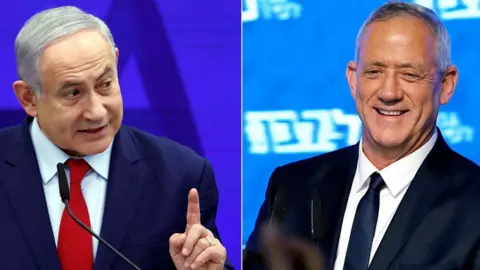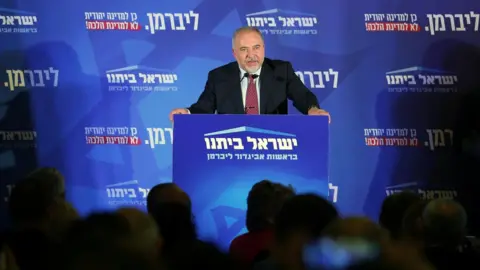Israel election: Netanyahu and rival Gantz headed for deadlock
 Reuters
ReutersNo clear winner has emerged from Israel's election, leaving a question mark over who will be prime minister, partial official results show.
With 63% of votes counted, the party of right-wing incumbent Benjamin Netanyahu is just behind that of his centrist main challenger, Benny Gantz.
The results indicate that both men will struggle to form a majority coalition with smaller parties.
Mr Netanyahu is hoping to stay in power for a record fifth term.
Citing sources in the Central Election Committee, Israeli media reported that Mr Gantz's Blue and White alliance was on track to win 33 of the 120 seats in the Knesset (parliament), followed by Mr Netanyahu's Likud party with 32 seats.
A centre-left bloc led by Mr Gantz and a bloc of right-wing and religious parties led by Mr Netanyahu were both projected to control 56 seats - five short of a majority.
Mr Netanyahu, who became Israel's longest-serving prime minister in July, has been in office for three consecutive terms since 2009.
The 69-year-old has pledged to unilaterally annex Jewish settlements and a swathe of other territory in the occupied West Bank if he is returned to power.
Palestinians, who seek a state in the West Bank and Gaza, with its capital in occupied East Jerusalem, have warned such a move will kill any hopes for peace.
Mr Gantz has not advocated any form of annexation, though his position on the creation of a Palestinian state is unclear. Like Mr Netanyahu, he has ruled out ever dividing Jerusalem.
What are the latest results?
Official results have been slow to be released by the Central Election Committee, with only 63.4% of votes counted by 22:16 (19:16 GMT) on Wednesday.
They put Blue and White about 1.6 percentage points ahead of Likud in the vote count. The Joint List, an alliance of Arab parties, was in third place, the ultra-Orthodox Shas party fourth, and Yisrael Beiteinu, a nationalist party, fifth.
The CEC tally does not say how this translates into seats in the Knesset.
 AFP
AFPBased on the projections by Israeli media, neither Mr Gantz nor Mr Netanyahu would be able to form a majority coalition without support from Yisrael Beiteinu.
Its leader, Avigdor Lieberman, reiterated on Wednesday that he would only support a unity government that included Likud and Blue and White.
However, Mr Gantz has ruled out sitting with Likud if it is led by Mr Netanyahu because the prime minister is facing charges of bribery, fraud and breach of trust in connection with three corruption cases, pending a final hearing next month.
Mr Netanyahu denies any wrongdoing.

Netanyahu weakened
Analysis by Tom Bateman, BBC Middle East correspondent, Jerusalem
The prime minister is well short of being able to form a governing bloc of right-wing and religious parties that are prepared to sit with him. In fact the result leaves him in an even weaker position than he was after April's vote.
It's almost impossible to predict the outcome, with frenetic horse trading on the way and even the chance of parties fragmenting or politicians shifting allegiances. But as it stands, three broad themes seem among the possibilities:
- A dominant new governing bloc of the two big rival parties: Likud with Blue and White. This only seems possible without Mr Netanyahu as Likud leader. Needless to say that's a deal breaker for him and, so far at least, for his party
- Mr Netanyahu's political rival Avigdor Lieberman miraculously changes his mind and agrees to join a right-wing and religious Netanyahu government - something his voters understood would never happen
- A third election - which nobody here has an appetite for
In the meantime, Mr Netanyahu stays on, but watch this space. For a few weeks.

In a speech to supporters at a post-election rally in Tel Aviv late on Tuesday, Mr Gantz said he wanted to form a "broad unity government that will express the will of the people" and "start the journey of repairing Israeli society".
"We will begin negotiations and I will speak with everyone," he added.
 Reuters
ReutersThe former military chief said he would reach out to Yisrael Beitenu and the left-wing Labour-Gesher and Democratic Camp parties. He did not mention the Joint List, which is unlikely to sit in any Israeli government, but later spoke by telephone with its leader Ayman Odeh.
At a news conference in Jerusalem on Wednesday night, Mr Netanyahu said: "There are only two options, a government led by me or a dangerous government dependent on the Arab parties."
Mr Lieberman prevented Mr Netanyahu from forming a coalition after the last election in April because he refused to back down in a longstanding dispute with religious parties over exempting ultra-Orthodox young men from military service.
